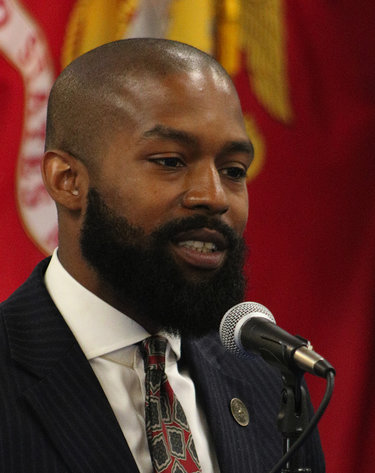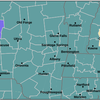A safe place for people of color to share history and love
ALBANY COUNTY — The tall brick building at the corner of Madison and South Pearl in Albany was built in 1890 — the same year that the first African American was elected to office in Albany, a city judge.
Travon Jackson knows this history because he is the executive director of the African American Cultural Center of the Capital Region, which is housed there.
The building, he said, is steeped in Albany history — “a cross section across four different floors of commerce.”
Jackson went on, “What is really a revolutionary idea — that there is a space for people of color to assemble and share history and love of one another and bring that to walls outside of their own in a safe place.”
The center is holding a Juneteenth celebration on Saturday, from noon to 3 p.m. where soul food will be served, music will be played, and a reflection garden will be dedicated.
For those who don’t feel comfortable coming in person, Jackson said, educational content will be streamed on Facebook and Instagram along with music provided by Jeid Ebanks, JahQuai Oliver, Ewart Simpson, Lina Kim, and Kai Yola.
To prevent the spread of the coronavirus, social distancing will be observed and the Albany County Black Caucus will provide masks, gloves, and sanitizer.
The newly landscaped garden, Jackson said, is a “safe space for people of color and the oppressed to demonstrate, grieve, and celebrate.”
“The country and the nation at large is generally in a period of unrest,” Jackson said at Friday’s county press briefing. “And I’m happy to report that the mission of the center is to create a safe space for people of color and the oppressed to exist outside of the unrest and learn more, and more deeply, about our history and our plight and our struggle and our strength and bring that to the fore.”
Jackson thanked the supporters who helped the center after bricks were thrown through its windows two weeks ago, which he called “a hateful act.”
“As a black man, I’m always prepared and that’s why, in that, I’m still able to find a light of love, which is the support all of you have given, all of you will give,” said Jackson.
Albany has had an annual Juneteenth celebration for 17 years, Jackson said, and the festivities were moved several years ago to the South Pearl neighborhood.
“We wanted to do that because we’ve seen, with the riots that took place … they’re often outside factors, outside agitators, outside struggles, emotional hang-ups that prevent us from operating safely and moving in a condition of love,” he said.
Jackson spoke of the South Pearl neighborhood with love and concern, urging, for example, that permanent seating be installed so that elderly residents of the senior center have a place to rest on their way to the grocery store, rather than having to lean on a fence as they do now.
“The street has not been beautified,” he said.
Describing Juneteenth, which this year Governor Andrew Cuomo, Albany Mayor Kathy Sheehan and Albany County Executive Daniel McCoy declared a holiday, Jackson said, “It’s about the history of slavery for over 400 years in this country. It is the history of family separation. It is the history of disenfranchisement on a legal basis when a physical basis would no longer stand.
“It is the continued disenfranchisement of these peoples with systems and powers and entities that aim to move forward in their own emotion rather than the universal emotion of love.”
On June 19, 1865, Jackson said, it took Union soldiers in Galveston, Texas to “somewhat threateningly, enforceably reminding soldiers that they lost and that this loss stood.” The celebration of freedom for the enslaved came two-and-a-half years after Abraham Lincoln issued the Emancipation Proclamation.
Jackson spoke of the need to “educate ourselves” and “learn of legends beyond the basics that we’re taught in our history books and textbooks that should be updated.” He went on, “You think of the Malcolm Xs and the James Baldwins and the Bayard Rustins who organized for figures like Martin Luther King, who many know.”
Jackson said that, like King, he studied at Morehouse College in Atlanta. “I was blessed enough to walk the same campus and share the same living residence and read his personal notes,” said Jackson, “and I can tell you that the core of Dr. King’s message was about making sure that oppressed and people of color lived equally whether that be in love, peace, or shared existence among any people.”
He continued, “In that you find the message of moving forward because the true challenge is to see how that’s possible in a time when we have a virus restricting our moves and our desires, our arts and our culture.”
Jackson said that, during the pandemic, all kinds of violence — domestic, gun, verbal — have increased. He also said there is a challenge to maintain mental health.
On Saturday, the center’s garden is being “rededicated to the ongoing struggle for peaceful protests and accountability for those who have died and lost their lives and been maimed at the hand of police brutality in this country,” Jackson said.
He concluded, “There is a deeper effort at the cultural center to present our freedom and our love and our existence to all people who are interested and to all people who support.”



